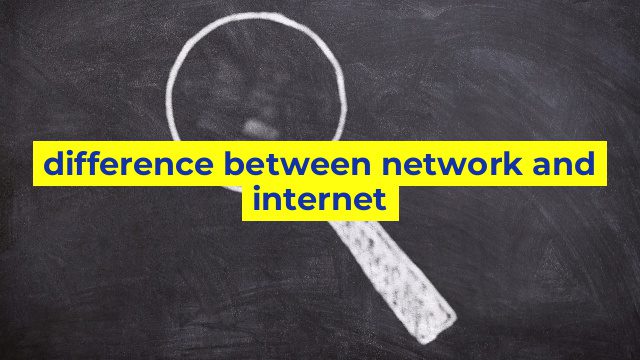The Difference Between Network and Internet: Explained
In today’s digital age, terms such as network and internet are often used interchangeably. However, they are not the same. Understanding the difference can help you have a better understanding of how you connect and communicate with others.
What is a Network?
In its simplest definition, a network is a group of devices that are connected to each other to share resources and communicate with one another. Networks can be small, such as a home network, which connects a few devices like computers and printers, or large, such as an enterprise network that connects several devices across multiple locations.
There are different types of networks, such as LAN (Local Area Network), WAN (Wide Area Network), and WLAN (Wireless Local Area Network). Each type is unique in terms of its range, size, and purpose. Network devices include routers, switches, hubs, and firewalls.
What is the Internet?
The internet is a global network of interconnected networks that communicate with each other using the standard Internet Protocol (IP). It is a vast network of millions of computers and servers located worldwide, and it allows for the sharing of information, communication, and access to services.
The internet connects people and organizations from around the world and allows us to access information from anywhere, at any time. The internet is often accessed through internet service providers (ISPs), which provide internet connectivity services to individuals and businesses.
The Differences Between Network and Internet
While a network is a group of devices that are connected to each other, the internet is a vast network of interconnected networks that communicate with each other.
The internet is a public network that is accessible to anyone with an internet connection. Networks, on the other hand, can be public or private, depending on the purpose and the level of authorization that is required to access them.
Networks are typically smaller and are used for internal communication and resource sharing within an organization, whereas the internet is used for external communication and access to resources and services located outside the organization.
In conclusion, networks and the internet are not the same, though they are often used interchangeably. Understanding the difference between the two can help you better understand the technology that connects and empowers us in today’s interconnected world.
Table difference between network and internet
| Network | Internet |
|---|---|
| A network is a collection of devices such as computers, printers, and servers, connected together to allow communication and sharing of resources within a specific area, such as a home, office, or campus. | The internet is a worldwide network of computers and servers connected together using various technologies, which allows people to access information and communicate with each other from anywhere in the world. |
| A network can be small or large, and can be either wired or wireless. | The internet is a massive network of networks, consisting of millions of interconnected devices and servers located around the world. |
| A network can be private, meaning that only authorized users can access it, or it can be public, meaning that it is accessible to anyone. | The internet is open to anyone with an internet connection and can be used to access a wide range of resources and services. |
| Networks can be used for a variety of purposes, such as sharing files and resources, backing up data, and communicating with other users on the network. | The internet is used for a wide range of purposes, including emailing, online shopping, social networking, and accessing an unlimited amount of information and resources. |
| Security is an important concern on any network, as unauthorized access can lead to confidentiality breaches and data theft. | Security is also an important concern on the internet, as it can be a breeding ground for malicious activities such as hacking, identity theft, and phishing. |

